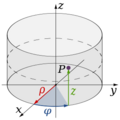The official discord link if you wish to join the discord: https://discord.gg/j5RKwCvAFu
Support the wiki on our official Ko-Fi page or Patreon page!
Dimensionality

Dimension
In physics and mathematics, the dimension of a mathematical space (or object) is informally defined as the minimum number of coordinates needed to specify any point within it. Thus a line has a dimension of one (1-D) because only one coordinate is needed to specify a point on it; for example, the point at 5 on a number line. A surface such as a plane or the surface of a cylinder or sphere has a dimension of two (2-D) because two coordinates are needed to specify a point on it for example, both a latitude and longitude are required to locate a point on the surface of a sphere. The inside of a cube, a cylinder or a sphere is three-dimensional (3-D) because three coordinates are needed to locate a point within these spaces.
In classical mechanics, space and time are different categories and refer to absolute space and time. That conception of the world is a four-dimensional space but not the one that was found necessary to describe electromagnetism. The four dimensions (4-D) of spacetime consist of events that are not absolutely defined spatially and temporally, but rather are known relative to the motion of an observer. Minkowski space first approximates the universe without gravity; the pseudo-Riemannian manifolds of general relativity describe spacetime with matter and gravity.
The concept of dimension is not restricted to physical objects. High-dimensional spaces frequently occur in mathematics and the sciences. They may be parameter spaces or configuration spaces such as in Lagrangian or Hamiltonian mechanics; these are abstract spaces, independent of the physical space in which we live.
Dimensional Tiering
First it must be known that the tiering for dimensionality and the tiering for the Tiering System are not connected. Dimensionality is based off one's dimension which has to deal with vectors and not a scalar quantity.
Our tiering is based off qualitative superiority over a certain level, for more detailed information see Hierarchies and Dimensional Tiering Explanation.
It should be noted that if one is infinite in size in a dimensional plane, that does not constitute the next dimensional plane of existence. Lines can extend forever in the first dimension with no beginning or end, but they still don't possess width to make them 2nd dimensional. Therefore, one can possess infinite size, but they are still limited to the dimensional plane they reside on.
For dimensionality, on pages, we mainly go by spatial dimensions, if a character has temporal axes, then it must be added along with the spatial dimension. For example, a character that is the unvierse itself and embodies all of it, would be 3+1D as they have 3 spatial dimensions and one temporal dimension.
Spatial Dimensions
Classical physics theories describe three physical dimensions: from a particular point in space, the basic directions in which we can move are up/down, left/right, and forward/backward. Movement in any other direction can be expressed in terms of just these three. Moving down is the same as moving up a negative distance. Moving diagonally upward and forward is just as the name of the direction implies; i.e., moving in a linear combination of up and forward. In its simplest form: a line describes one dimension, a plane describes two dimensions, and a cube describes three dimensions.
Temporal Dimensions
A temporal dimension, or time dimension, is a dimension of time. Time is often referred to as the "fourth dimension" for this reason, but that is not to imply that it is a spatial dimension. A temporal dimension is one way to measure physical change. It is perceived differently from the three spatial dimensions in that there is only one of it, and that we cannot move freely in time but subjectively move in one direction.
Additional terms
At least
Should be used to denote the lower cap of a character, if the exact value is indeterminate. Usually listed for characters that have implied to have a higher dimensionality.
Likely
Should be used to list a hypothetical dimensionality, but inconclusive due to uncertainty. Probability of said hypothetical statistic should be favourable.
Possibly
Should be used to list a hypothetical dimensionality, but inconclusive due to uncertainty. Probability of said hypothetical statistic should also be indeterminate.
Higher-Dimensional Existence
Higher-Dimensional Existence refers to characters who belong to higher worlds or planes of reality with a number of dimensions greater than three-dimensional universes. In other words, they have bodies of at least four dimensions. The difference between these characters and those from ordinary space-time reality corresponds to the geometric difference between objects with different numbers of dimensions, such as a two-dimensional square and a three-dimensional cube. Characters of higher dimensions can be shown to be godlike with respect to lower dimensions, not only because of their superiority in strength but also due to their existence encompassing completely different laws of physics and logic, which are beyond the control of three-dimensional beings, however this isn't always the case. Most of the time a higher-dimensional being is treated as equal to a lower-dimensional being, wiwth the lower dimensional being capable of even interacting with them. For a higher-dimensional being to get a higher tier they need to eb proven to have an uncountably infinite transcendence compared to a 3-D being. It should be noted that having higher-dimensional power does not mean the character has a higher-dimensional existence, nor does higher-dimensional movement or Extra-Temporal speed, but some of these do mean that such characters can contend with these beings.
Regarding Dimensionality Through Feats
There is also a common misconception with believing that forming a higher-heirarchal feat suddenly equates to your dimensionality being raised, this is not the case. For one, dimensionality and hierarchal aren't interchangable, though if we play devils advocate and assume they are. One can do a higher-dimensional feat without being of that dimensionality due to their power. The common argument against this is the argument of "how can a 3-D being perceive or interact with a 4-D one" but this ignores that there have been actual real life studies on 3-D beings traveling in 4th dimensional mazes. The way you get a higher form of dimensionality is if they are directly shown to exist on a higher dimension, normally they would be able to show abilities such as having spatial intangibility as they're on a new axis. Along with this, at the end of the day the verses we are dealing with are fictious and thus the author can ignore such contradictions.
Regarding the temporal dimension
There is only 1 temporal dimension, even up to the infinite mark. The temporal dimension will always stack up on top of the spatial dimensions. For example, a theoretical 20th dimension would consist of 19 spatial dimensions and 1 temporal dimension, but the 34th dimension consists of 33 spatial dimensions and 1 temporal dimension. Regardless of the number if it's anything from the 4th and above, there will only be one time dimension. Of course, this is when following the regular theory. There can exist verses with multiple temporal dimensions, normally during this you would have it as, 3 (spatial dimensions) + n (number of temporal dimensions) for the full expanse of your reality.
What happens when a higher dimensional being interacts with a lower-dimensional plane of existence
For example, if one was to put their hand through the second dimension, that second-dimensional entity would view their hand as slowly coming in and folding in with size as it can't view the third-dimensional hand. The same thing happens here for when a fourth-dimensional being interacts with the third-dimensional plane and so on.
Important note:
It should be noted that the term dimensions when on the wiki should normally be used for spatial and temporal dimensions, dimensions referencing universes, pocket universes, realms, worlds, realities, etcetera, should be noted somewhere on the page.
It is common within fiction, to misuse the term in such contexts such as Star Vs. The Forces of Evil where the term dimension is used consistently to refer to an alternate universe. This is due to what a parallel dimension is by definition, a parallel axis. This essentially is just saying that a parallel dimension is a parallel space-time. So while technically this is referring to the spatial and temporal context it's one where it wouldn't warrant a higher dimensional upgrade. Take note of this when dimensions are ever mentioned.
It should also be noted if the term dimension is used with no context such as an alternate universe behind it, the normal assumption is that it's spatial. As most verses would give details that lead it to an alternate universe, such as Star Vs. The Forces of Evil.
Any beings above the concept of dimensions or who lack dimensions as a whole are listed as "Devoid" in dimensionality.
Discussions (Link For Mobile Users):
| Discussion threads involving Dimensionality |








